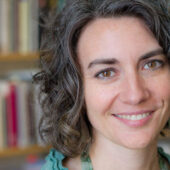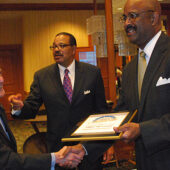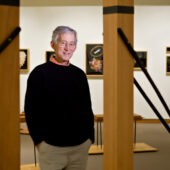Reading aloud
 As an undergraduate studying abroad at Oxford, Jessica Richard was introduced to tutorial-style grading. Now on the other side of the desk, she uses the "paper conference" as a way to help her students learn to become better writers.
As an undergraduate studying abroad at Oxford, Jessica Richard was introduced to tutorial-style grading. Now on the other side of the desk, she uses the "paper conference" as a way to help her students learn to become better writers.
 Senior chemistry major Allison Faig and professors Bruce King and Patricia Dos Santos are researching how antibiotics destroy dangerous bacteria in the body — hoping their work will lead to the development of new weapons against disease.
Senior chemistry major Allison Faig and professors Bruce King and Patricia Dos Santos are researching how antibiotics destroy dangerous bacteria in the body — hoping their work will lead to the development of new weapons against disease. With concern for healthier eating, community gardens are experiencing unprecedented growth. Experts offer insights into the benefits of sharing the work and the food.
With concern for healthier eating, community gardens are experiencing unprecedented growth. Experts offer insights into the benefits of sharing the work and the food. Wake Forest Professor of Church History Bill Leonard and Divinity School graduate Rev. Yvonne Hines (MDiv. ’04) each received the Lifetime Achievement Award for Community Service at The Chronicle’s 26th annual Community Service Awards on March 19.
Wake Forest Professor of Church History Bill Leonard and Divinity School graduate Rev. Yvonne Hines (MDiv. ’04) each received the Lifetime Achievement Award for Community Service at The Chronicle’s 26th annual Community Service Awards on March 19. The late Bob Knott dedicated much of his time during his long career teaching art at Wake Forest to helping students build the Student Union Collection of Contemporary Art. Some of his artwork will be sold during this Friday's Gallery Hop in downtown Winston-Salem to continue his passion for the Student Union collection.
The late Bob Knott dedicated much of his time during his long career teaching art at Wake Forest to helping students build the Student Union Collection of Contemporary Art. Some of his artwork will be sold during this Friday's Gallery Hop in downtown Winston-Salem to continue his passion for the Student Union collection. Nuhu Yaqub, the Fulbright Scholar-in-Residence, will discuss how corruption in Africa has limited economic and political development in a continent rich with natural resources during a lecture on Monday. It's part of a new series, "Winston-Salem and the World Scene," sponsored by Wake Forest and other local colleges and universities.
Nuhu Yaqub, the Fulbright Scholar-in-Residence, will discuss how corruption in Africa has limited economic and political development in a continent rich with natural resources during a lecture on Monday. It's part of a new series, "Winston-Salem and the World Scene," sponsored by Wake Forest and other local colleges and universities. Missing pieces in the biodiversity puzzle make it impossible to accurately predict the effects of climate change on most plant species in the Amazon and other tropical areas, according to a new study by Associate Professor of Biology Miles Silman. The scarcity of data on many species raises new questions for conservation biologists.
Missing pieces in the biodiversity puzzle make it impossible to accurately predict the effects of climate change on most plant species in the Amazon and other tropical areas, according to a new study by Associate Professor of Biology Miles Silman. The scarcity of data on many species raises new questions for conservation biologists.
 Entrepreneurs from universities in the U.S., Canada and Thailand will compete for cash to help turn their ideas into innovations during the 12th Annual Wake Forest University Elevator Competition on March 25 and 26.
Entrepreneurs from universities in the U.S., Canada and Thailand will compete for cash to help turn their ideas into innovations during the 12th Annual Wake Forest University Elevator Competition on March 25 and 26. If college counseling for underrepresented students does not become a crucial part of education reform, then reform will not bear nearly enough fruit, writes Omari Simmons, an associate professor at the School of Law.
If college counseling for underrepresented students does not become a crucial part of education reform, then reform will not bear nearly enough fruit, writes Omari Simmons, an associate professor at the School of Law. Professor Emeritus of Chemistry Paul Gross, who taught from 1959 until 1987, died March 17. For nearly 20 years, Gross was the coordinator of the University’s interdisciplinary honors program.
Professor Emeritus of Chemistry Paul Gross, who taught from 1959 until 1987, died March 17. For nearly 20 years, Gross was the coordinator of the University’s interdisciplinary honors program.